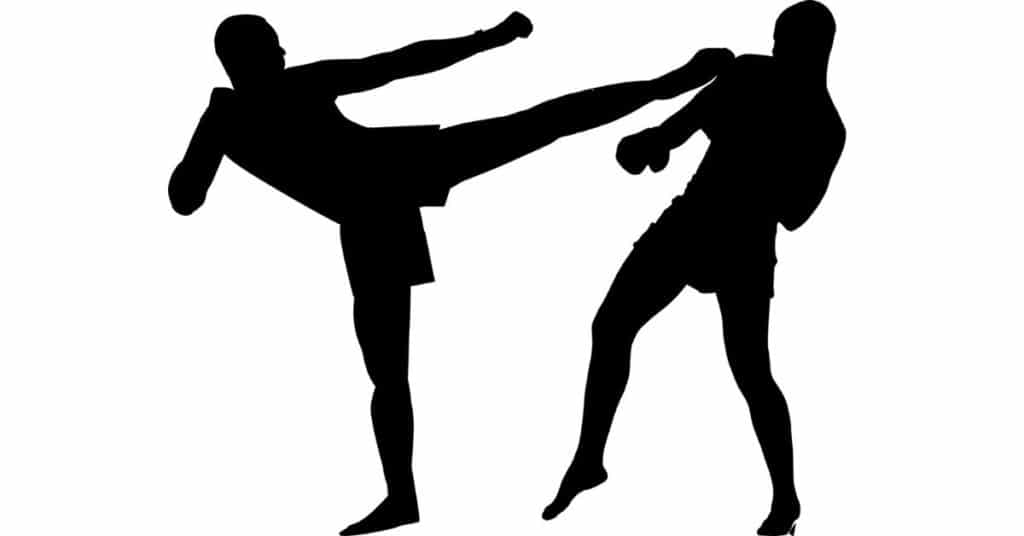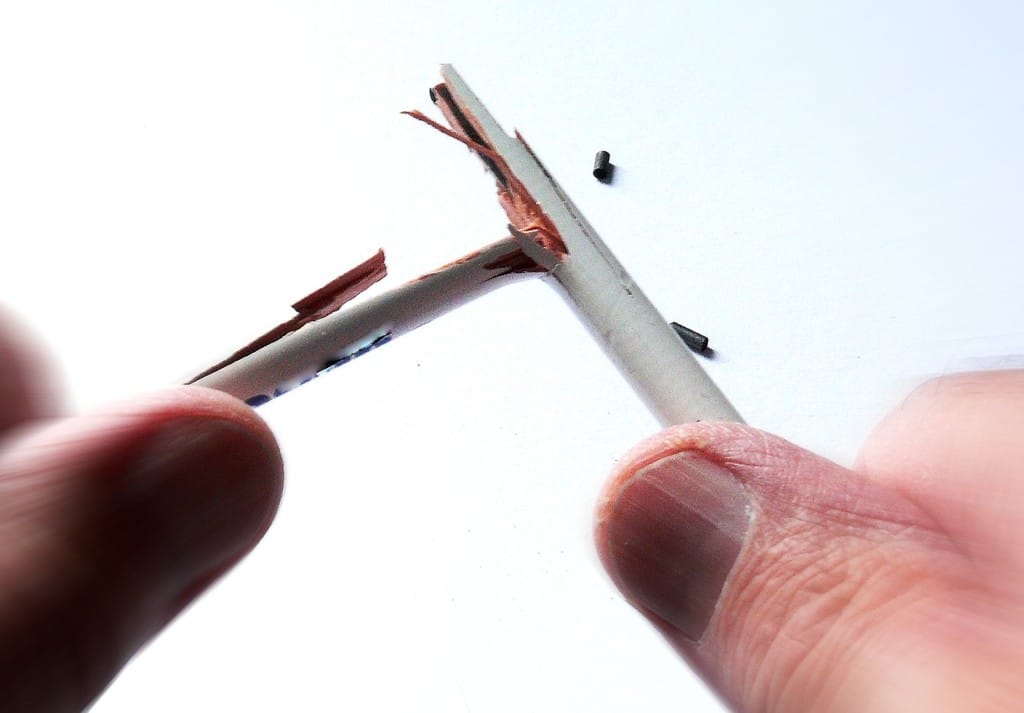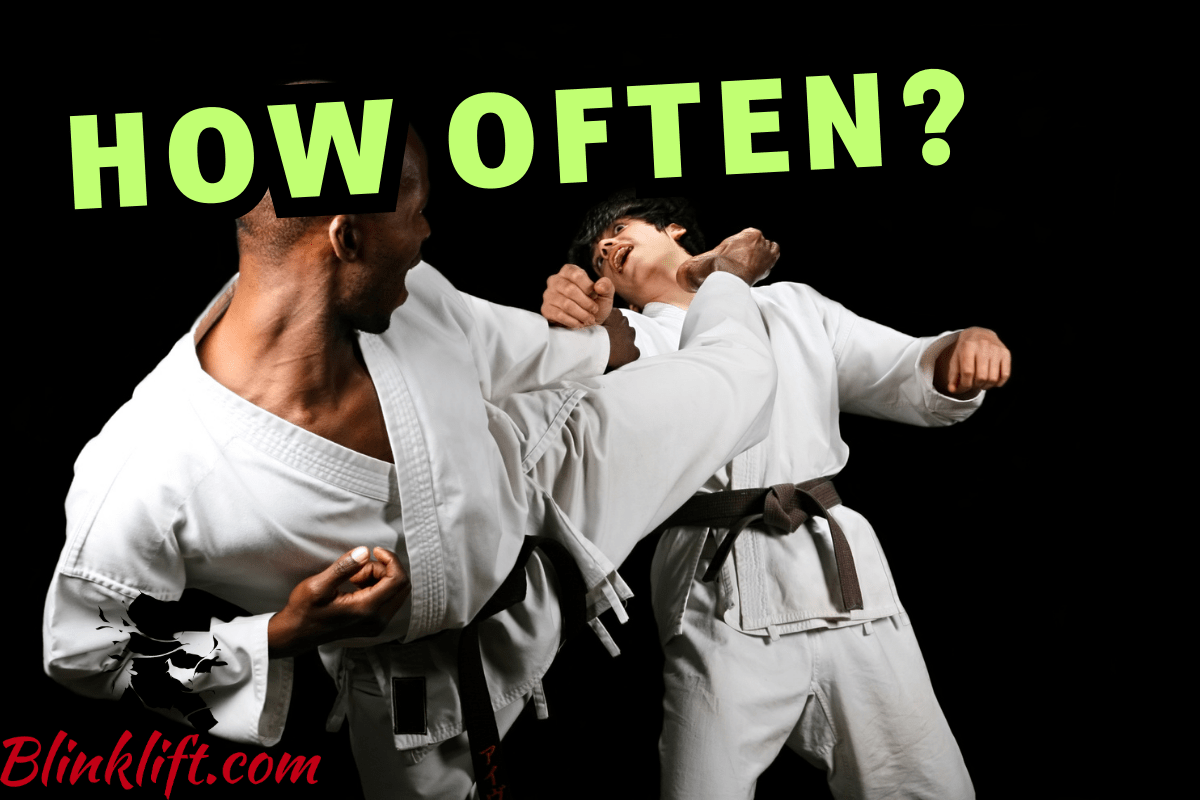Knowing how often you should practice martial arts is crucial for seeing results. That way, you’ll progress quickly and smoothly.
Overtraining is a possibility in most sports. It can set you back and ensure you’re missing training. As a result, not only will you not progress, but you’ll also miss out on the actual classes. Let’s dive into how often you should train.
As a general rule, training twice a week on nonconsecutive days will ensure the avoidance of overtraining. Because your muscles will have enough time to recover from the stress martial arts training causes, you’ll recuperate adequately. As a result, training twice a week is ideal.
Yet, there’s more to it. I’ve experienced several injuries related to how often I trained. I want you to avoid as much of that as possible. Hence you’ll be progressing faster than ever.
I recommend you to read an article of mine on the 11 reasons to learn martial arts. If you haven’t decided whether you want to train one, it’ll give you perspective and change your mindset on the topic. That way, you’ll make a wiser decision.
Before jumping in, I do want to recommend two products that I’ve had significant success with using. They ensured I was progressing even when I was at home. These are this punching bag by Everlast and these MMA gloves. Let’s dive into the article.
How many times a week should I train in martial arts?
Weekly training is a suitable metric to follow. That way, you’ll ensure you’re not hurting yourself by training too often. Thus you’ll progress quickly and without any trouble.
Training twice a week on nonconsecutive days will be ideal for martial arts training. Because your muscles will be under plenty of stress in training, you must grant them time to recover. That way, not only will you be bettering your physical shape, but you’ll also avoid injuries.
Yet, training once a week is a fantastic choice. Throughout my life, I’ve trained once a week. I’ve seen plenty of results that way, especially in my Krav Maga training. I balanced the amount of training and the progress I’ve noticed.
Additionally, training three times a week is an option. When talking about muscle recovery, we must understand the process. If we want to allow hypertrophy to take on, we must know when our body is ready for another session.
Because of that, lifting weights in a full-body routine training plan will have three workouts every week. Accordingly, the muscles will have a workday followed by a rest day. As a result, you’ll promote hypertrophy, and your muscles will be ready for the next training session.
Let’s recap. Training between once to three times a week is the ideal number. Overall, I would advise starting with once-twice a week. As a result, you’ll ensure you’re not overtraining. Eventually, training less than once a week is too little, and more puts you at risk of unnecessary injuries.
How long should my martial arts training be?
While training for too long per session may cause muscle fatigue, working too little will not make you progress. To maximize our results while avoiding injuries, we must understand how long our martial arts training should be. Let’s see the numbers.
On average, a martial arts session should be 90 minutes long. Such a period will ensure you’re not promoting muscle fatigue while ensuring your progress. Yet, this number varies widely according to the intensity and the frequency of training. As a result, looking at these factors is vital.
“In this study, 29 hours of training was necessary to train novice students to be proficient in 21 offensive and defensive martial arts techniques.”
(Source)

Let’s take a step back. On average, it took 82 minutes of training to be proficient in a single martial arts technique. From that, we understand that if we train a movement for a single 90 minutes session, we’ll be able to perfect it.
Thus if we train twice a week, we’ll become proficient in 8 techniques a month. You can take whichever lesson you want from this study. Yet, I think there’s a clear one that stands out. We can manageably and somewhat quickly master the techniques in martial arts. With enough consistent work, you’ll be able to progress fast.
However, you must know when to stop training. You need to understand that the amount of effort you’re investing isn’t always the number of benefits you’ll receive.
For instance, if I were to train every day for 4 hours, I would injure myself after a few days. Because of that, the amount of effort I invested was more than the progression I witnessed.
It’s an intensely thin line between maximizing results and overtraining. Consequently, we want to ensure our progress. So, we can’t train too much. Although this may assist us in perfecting the techniques, our muscles won’t take the load. That’s when injuries occur.
Can I practice martial arts every day?
Knowing how often to practice martial arts is vital for seeing progress. At times, the amount of effort you’re putting into training will not correlate with progression. We call that overtraining. The effect you’ll be attracting is muscle fatigue.
As a general rule, practicing martial arts daily is risky yet possible because you may attract muscle soreness and fatigue. That will retract the benefits and progression from occurring. Thus you’ll be wasting your time. Furthermore, you may hurt yourself by training every day.
As I’ve specified in the previous section, practicing martial arts twice a week is ideal for promoting hypertrophy, essentially muscle recovery. That way, you’ll ensure your progress and begin noticing some of the benefits martial arts has to offer.
I wrote an article about the benefits you’ll experience from martial arts training. If you want to know what to expect, I highly encourage you to check it out.
You must understand the difference between an intense and a moderate workout. If you’re doing Boxing every day for a week, you’ll be injuring yourself. Yet, if you’re including meditation as a martial arts practice you won’t overtrain since it doesn’t influence hypertrophy.
Overall, being in a good school will solve all of your problems since the instructor knows how to avoid injuries. Because of that, signing up to be under a solid instructor; is more vital than choosing which fighting style you want to learn. A suitable mentor will ensure you’re not overtraining, hence progressing.
What is overtraining in martial arts?
As it’s more of a fitness term, I’ll avoid defining it in my own words. Yet, you must understand that it does exist. Overtraining is a thing that many people experience. The main effect is that you won’t experience hypertrophy, which is muscle recovery. As a result, you won’t progress.
Overtraining in martial arts is training too often or too intensely that our muscles can’t recover unless we rest for a prolonged period. Because we use many muscle groups in training, we won’t progress further. For instance, we use our back and shoulder muscles while striking.
“Many athletes believe that weakness or poor performance signals the need for even harder training, so they continue to push themselves. This only breaks down the body further.”
(Source)

For that reason, if you want to maximize your results, you must follow the guidelines for avoiding martial arts. Next, I’ll explain how you can bypass overtraining altogether. Additionally, I will recommend you to read an article of mine on whether martial arts get you in shape. It’ll further explain this issue.
Knowing to recognize when you’re doing too much work is crucial for never experiencing it. Consequently, one can ensure progression by following these steps.
How to avoid overtraining in martial arts?
The primary signal when you’re overtraining is muscle soreness and muscle fatigue. How can I recognize that feeling? It’s relatively simple, actually. If you wake up on a consecutive day feeling sore, you should lower the training frequency.
The following list is how you can avoid overtraining in martial arts
- Lower training frequency
- Lower intensity levels in training
- Eat properly
- Train with appropriate from
- Embrace rest days
Overall, by implementing these steps, you’ll overcome overtraining. As a result, you’ll be able to continue practicing your fighting style. That’s especially crucial to understand and know how to implement.
Your sign for overtraining should be waking up on consecutive days feeling sore. If that’s the case, ensure you’re eating appropriately (Here’s how to do it) and embracing rest days, which means you’re not participating in any physical activity when you don’t need it.
You must understand that while that’s an important matter you should stay away from, having a healthy balance of training is fundamental. So, training every day is unhealthy. Yet, meditating every day is beneficial. Understand what to do less often, and you’ll have an effortless time avoiding overtraining.
How long until I master a martial art?
Mastering the martial art you practice shouldn’t be your goal. Instead, bettering yourself physically and mentally is what matters. Yet, knowing the timeline you should expect from investing all that effort into training is vital for staying consistent.
As a whole, mastering a martial art can take up to 20 years. Yet, some will require you to consistently train for 2-5 years, such as Karate. As a result, if you want to reach a black belt in your fighting style, asking other black belt individuals how long it took will provide an accurate estimation.
Yet, it varies. If you invest more effort than the average trainee, you may be receiving your black belt after 2-3 years. However, if you’re not consistent in martial arts training, you won’t master it. It’s as simple as that.
That said, you can expect to become decent in the fighting style after a few months. You’ll be able to use it for most purposes, such as self-defense and plenty more.
For that reason, I don’t have the exact time you’ll be receiving your black belt. After all, I don’t know you personally, which is too bad because I’m a nice guy.
Conclusion
Many people wonder about the frequency with which they need to practice martial arts. Yet, some experience what the fitness realm calls overtraining. Such a thing will cause muscle fatigue and soreness. As a result, you’ll not be progressing while overtraining.
While you may perfect the techniques, your physical condition won’t improve. As a result, you won’t be able to hit the punching bag better than in the last training session.
Understanding the thin line between maximizing results and overtraining is crucial for martial arts. If you sign up for a suitable school with a solid instructor, you won’t experience any issues as the instructor knows how to avoid injuries.

